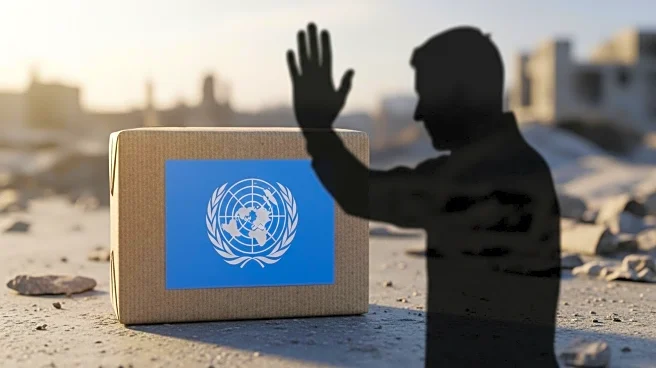What's Happening?
COGAT, the Coordinator of Government Activities in the Territories, has accused Hamas of obstructing humanitarian aid deliveries in Gaza. According to reports, Hamas has allegedly opened fire on United Nations vehicles attempting to deliver aid, and has stolen these vehicles. Additionally, sandbags have been placed on routes to prevent further aid deliveries. This interference has been noted by Prime Minister Benjamin Netanyahu and the Israel Defense Forces (IDF), who claim that Hamas is blocking deliveries and stealing supplies. The situation has raised concerns among international organizations, including the United Nations, about the worsening humanitarian conditions in Gaza.
Why It's Important?
The interference by Hamas in aid deliveries has significant implications for the humanitarian situation in Gaza. The obstruction of aid not only exacerbates the already dire conditions faced by civilians but also complicates international efforts to provide relief. This situation could lead to increased tensions between Israel and Hamas, potentially affecting regional stability. The actions of Hamas may also impact the perception and effectiveness of international organizations like the United Nations in delivering aid, thereby influencing future humanitarian strategies and policies in conflict zones.
What's Next?
The ongoing interference with aid deliveries may prompt international organizations and governments to reassess their strategies in Gaza. There could be increased diplomatic pressure on Hamas to allow unhindered access for humanitarian aid. Additionally, Israel and other stakeholders might explore alternative routes or methods to ensure aid reaches those in need. The situation may also lead to discussions at the United Nations regarding the protection of aid convoys and the enforcement of international humanitarian laws.
Beyond the Headlines
The actions of Hamas raise ethical and legal questions about the use of humanitarian aid as a tool in conflict. The deliberate obstruction of aid deliveries challenges the principles of neutrality and impartiality that underpin humanitarian efforts. This situation may lead to broader discussions on the responsibilities of non-state actors in conflict zones and the need for stronger international mechanisms to safeguard humanitarian operations.









